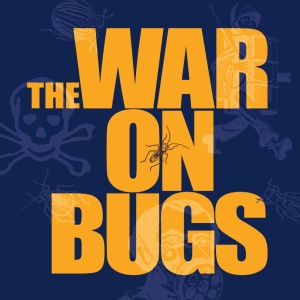Remembering Columbus Day: 2014 (REALITY CHECK)
October 13, 20142052: Our World In Forty Years, by Matthew Cibotti (BOOK REVIEW)
October 14, 2014The War On Bugs, by Joseph Humes (BOOK REVIEW)
We live in a society of ignorance. People use things and do things every day without first understanding what they are doing and why. Will Allen, a well-known farmer, activist, and social scholar, invades the concept of chemical use within agriculture by examining its origin and exposing its dangers. In The War on Bugs, Allen intertwines historical background, scientific investigation, and societal analysis to determine the truths about chemical use by farmers and to ask critical questions about where our farm products come from and how they are made.
Allen’s story begins with a historical narrative. He tells the story from the first-person perspective, as a young farmhand in California, and takes the reader through agricultural chemicals’ beginnings in the 19th Century and development into what they’ve become today. According to Allen, the prominence of farm pesticides can be attributed to ignorance by farmers and mass-manipulation by agribusiness moguls. Originally advertised as an essential part of agricultural production, a wide variety of dangerous chemicals like lead and DDT infiltrated farms throughout the US and world in the 1840’s, wreaking havoc on the U.S. landscape and our food systems over time.
Throughout his book, Allen tactfully uses personal experience to draw in the reader and connect them personally to the issue. He describes his first experience with pesticides. When he was a young farmhand tasked with swatting flies throughout the farm’s stables and barns, DDT was brought in to maximize the output of viable crops and minimize pest interference. DDT was used originally by simply releasing the fumes to eradicate flies and any other insects that found themselves in its vicinity. After a while, however, the insects became conditioned to the chemical. Allen’s farm was forced to periodically increase the amounts of DDT used to keep up with the pests’ evolving immunity. Eventually, once the pests developed legitimate immunity to DDT, the farm began experimenting with a potpourri of dangerous chemicals to keep the bugs at bay.
In Allen’s mind, what happened at his farm and at small (and large) farms all over the country unintentionally caused an addiction to pesticides. Equating the situation to a serious drug addiction, Allen outlines how minimal use of chemicals for pest removal gradually descended into a crippling dependency that threatens every fruit, vegetable, or animal that is produced by farms. Farm tradition allowed this dependency to continue to be transferred through generations and no one, especially not chemical companies, saw a reason to stop it.
Throughout The War on Bugs, grim analysis of pesticide use and society’s ignorance about it is paired with visuals that bring the concept to life. On almost every page, advertisements and news stories pepper the text to reflect the antagonistic manipulation by chemical companies and the futile humanitarian efforts to stop them. The imagery Allen utilizes in his book creates a time machine the soars the reader through the rich history of pesticides in the United States, and a brutal conflict that has been fought for centuries.
In the second half of his book, Allen takes the reader away from the social and scientific roots of agricultural chemical use and focuses on the relationship between small farmers and corporations. He succinctly depicts the origins of resistance to the use of chemicals by small farmers and chemicals’ strong enforcement by large companies. This aspect of the war, according to Allen, is purely socioeconomic. Large corporations and chemical companies want farms to use as much pesticides as possible, solely for money. They don’t think about the environmental impact or the fundamental damage to crops, and they ignore the clearly negative social implications of growing food with chemicals. Whether using truths or propaganda, corporate agriculture has spent centuries convincing farmers that pesticides are the only way to produce healthy crops.
Allen’s book is a gritty narrative that raises many untouched questions. He tries to weed away misinformation and manipulated reality to expose how agriculture is really affected by pesticides, both physically and economically. Although his position on the subject is clear from the first paragraph, Allen does a great job of offering multiple perspectives to promote individual interpretation by the reader. Throughout the book we hear from Allen himself, as well as both the small farms and the massive corporations. By the end, the reader is equipped with a creative and detailed understanding of an age-old social debate. We are engulfed in information, and are forced to ponder the questions posed by Will Allen. The War on Bugs leaves the reader in a whirlwind of dangerous chemicals, corporate exploitation, and prominent social debate.
Before reading this book, I had absolutely no knowledge about pesticide use in the United States. I try to shop locally, as I find a more fulfilling experience in purchasing something directly from its producer. This book forced me to think again about what I buy and where I buy it from, and it pushed me to ask more questions about the modern context of this debate. I wonder what the state of the “war on bugs” is in 2014, and how I could personally see its effects. Although Allen does not have many solutions to offer the reader, his approach to the issue provokes conscious further thought and investigation into a subject that affects every person that goes to the grocery store and buys fruits or vegetables.
For more revolutionary writing, visit Chelsea Green Publishing.
Share this:
- Click to print (Opens in new window)
- Click to email a link to a friend (Opens in new window)
- Click to share on Twitter (Opens in new window)
- Click to share on Facebook (Opens in new window)
- Click to share on Reddit (Opens in new window)
- Click to share on LinkedIn (Opens in new window)
- Click to share on Tumblr (Opens in new window)


